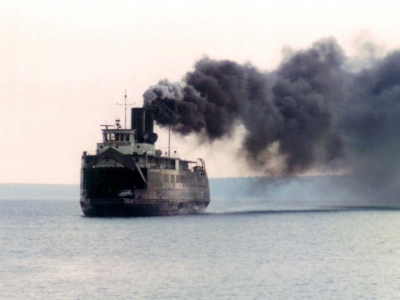Tanker professionals launch Virtual Arrival
The Oil Companies International Marine Forum (OCIMF) and Intertanko believe they can help cut 40% of CO₂ emissions in EU Maritime Transport by 2050 though a “sustainable emissions management framework”.
Key to the proposal is Virtual Arrival – a voyage management optimisation and vessel emission reduction tool developed together by the two industry bodies in collaboration with the European Union.
Virtual Arrival is a process that involves making an agreement to reduce a vessel’s speed on voyage to meet a revised arrival time when there is a known delay at the discharge port. Reducing the vessel’s speed will have a direct impact on fuel consumption, reduce emissions from the ship, improve safety and environmental concerns connected to congestion in ports and get the right amount of cargo to the right port at the right time. This results in a reduction in emissions but not in the delivered cargo capacity.
Before a vessel’s departure from the load port, or while en route to the discharge port when a delay is identified at the discharge port, for example due to lack of receiving space, a mutual agreement is made between two (or more) parties to adapt the ship’s arrival time to take advantage of the delay. Consequently, an agreed Charter Party clause that establishes the terms for reducing the speed to adapt to the new arrival time is identified. An agreement on how to calculate and report the performance of the vessel is then made, and may sometimes involve a trusted weather analysis service provider (WASP).
Virtual Arrival is seen as part of the EU’s mandate to improve the technology, fuel consumption and operations of the maritime industry, through which the EU, in cooperation with IMO and other international organisations, continues to explore numerous ways to help reduce greenhouse gas (GHG) emissions in the industry. According to the European Commission’s White Paper on the Future of Transport, EU CO₂ emissions from maritime transport need to be cut by 40% (50% if feasible) by 2050 compared to 2005 levels.
According to OCIMF, most industries, like maritime, are faced with the decision to improve efficiency and productivity in order to meet environmental and safety regulations. OCIMF says that Virtual Arrival offers “the opportunity to remove inefficiency within the transport chain through an agreed and managed optimisation of a vessel’s passage speed.” Trials implementing the Virtual Arrival scheme have shown it is possible to reduce a vessel’s fuel consumption and consequent CO₂ emissions by up to 22%.
Both OCIMF and Intertanko have collaborated to ensure that the Virtual Arrival project uses similar technical and operational measures to reduce greenhouse gas emissions in support of the aspirations of the IMO and the United Nations Framework Convention on Climate Change (UNFCCC).
With the shipping industry making up for 2.7% (IMO 2nd Green House Gas (GHG) study 2009) of total global annual CO₂ emissions, EU Transport Commissioner, Siim Kallas, was present at the launch to discuss the scheme benefits for the maritime industry and the overall EU transport strategy.
“In light of the global sustainable mobility race, the launching of Virtual Arrival yesterday in Brussels was undoubtedly one of many significant steps in curbing maritime transport emissions,” Kallas emphasised. “Virtual Arrival proves the maritime sector is capable of delivering effective and global solutions to reduce emissions while maintaining technology leadership and economic sustainability”.
David Cotterell, director of OCIMF, said: “The Virtual Arrival scheme is a long term, sustainable and practical process that rationalises the transportation chain and provides real benefits such as cutting vessel emissions through fuel reduction, improved safety, and potentially reducing unnecessary port congestion”.
Joe Angelo, Director of Intertanko, affirmed: “This project has been initiated by the industry and is a testament to ship owners’ commitment to reduce CO₂ emissions from maritime transport. Virtual Arrival ensures a chain of responsibility and involves key stakeholders leading to increased co-operation and the removal of potential commercial obstacles”.
Source: Intertanko





























































